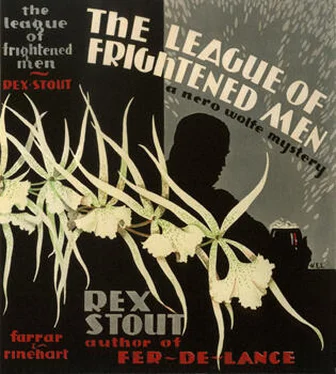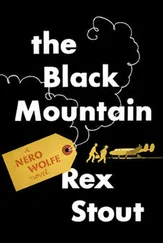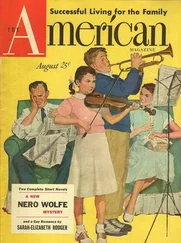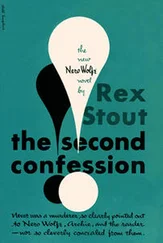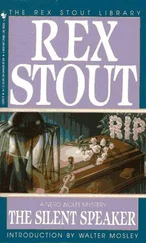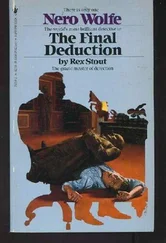“Now, Mr. Bowen, you made many mistakes, but none so idiotic as your sole reliance on Chapin’s obvious guilt, for that one was the father of all the others. Why in the name of heaven didn’t you turn on the light again as you went out? And why didn’t you wait until Chapin and Burton had talked a minute or two before you acted? You could have done just as well. Another inexcusable thing was your carelessness in leaving the gloves on the table. I know; you were so sure that they would be sure of Chapin that you thought nothing else mattered. You were worse than a tyro, you were a donkey. I tell you this, sir, your exposure is a credit to no one, least of all to me. Pfui!”
Wolfe stopped, abruptly, and turned to ring for Fritz, for beer. Bowen’s fingers had been twisting in and out, but now they had stopped that and were locked together. He was shaking all over, just sitting in his chair shaking, with no nerve left, no savvy, no nothing; he was nothing but a gob of scared meat.
Leopold Elkus came up and stood three feet from Bowen and stood staring at him; I had a feeling that he had a notion to cut him open and see what was inside. Mike Ayers appeared with another drink, but this time it wasn’t for Bowen, he held it out to me and I took it and drank it. Andrew Hibbard went to my desk and got the telephone and gave the operator the number of his home. Drummond was squeaking something to George Pratt. Nicholas Cabot passed around Bowen’s chair, went up to Wolfe and said to him in a tone not low enough for me not to hear:
“I’m going, Mr. Wolfe. I have an appointment. I want to say, there’s no reason why you shouldn’t get that twelve hundred dollars from Bowen. It’s a legal obligation. If you’d like me to handle the collection I’d be glad to do it and expect no fee. Let me know.”
That lawyer was tough.
Three days later, Thursday around noon, we had a caller. I had just got back from taking a vast and voluminous deposit to the bank, and was sitting at my desk bending my thoughts towards a little relaxation in the shape of an afternoon movie. Wolfe was in his chair, leaning back with his eyes shut, still and silent as a mountain, probably considering the adequacy of the plans for lunch.
Fritz came to the door and said: “A man to see you, sir. Mr. Paul Chapin.”
Wolfe opened his eyes to a slit, and nodded. I whirled my chair around, and stood up.
The cripple hobbled in. It was a bright day outside, and the strong light from the windows gave me a better look at him than I had ever had. I saw that his eyes weren’t quite as light-colored as I had thought; they were about the shade of dull aluminum; and his skin wasn’t dead pale, it was more like bleached leather, it looked tough. He gave me only half a glance as he thumped across to Wolfe’s desk. I moved a chair around for him.
“Good morning, Mr. Chapin.” Wolfe nearly opened his eyes. “You won’t be seated? I beg you... thanks. It gives me genuine discomfort to see people stand. Allow me to congratulate you on your appearance. If I had spent three days in the Tombs prison, as you did, I would be nothing but a wraith, a tattered remnant. How were the meals? I presume, unspeakable?”
The cripple lifted his shoulders, and dropped them. He didn’t appear to be settling down for a chat; he had lowered himself onto the edge of the chair I had placed for him, and perched there with his stick upright in front and both his hands resting on the crook. His aluminum eyes had the same amount of expression in them that aluminum usually has. He said:
“I sit for courtesy. To relieve you of discomfort. For a moment only. I came for the pair of gloves which you removed from my box.”
“Ah!” Wolfe’s eyes opened the rest of the way. “So your blessings are numbered. Indeed!”
Chapin nodded. “Luckily. May I have them?”
“Another disappointment.” Wolfe sighed. “I was thinking you had taken the trouble to call to convey your gratitude for my saving you from the electric chair. You are, of course, grateful?”
Chapin’s lips twisted. “I am as grateful as you would expect me to be. So we needn’t waste time on that. May I have the gloves?”
“You may.—Archie, if you please. To me.”
I got the gloves from a drawer of my desk and handed them across to Wolfe. He came forward in his chair to place them in front of him on his own desk, one neatly on top of the other, and to smooth them out. Chapin’s gaze was fastened on the gloves. Wolfe leaned back and sighed again.
“You know, Mr. Chapin, I never got to use them. I retained them, from your box, to demonstrate a point Monday evening by showing how nearly they fitted Mr. Bowen, thus explaining how Dora Chapin — your wife — could mistake Mr. Bowen’s gloves for a pair of Mrs. Burton’s; but since he wilted like a Dendrobium with root-rot there was no occasion for it. Now” — Wolfe wiggled a finger — “I don’t expect you to believe this, but it is nevertheless true that I halfway suspected that your knowledge of the contents of your box was intimate enough to make you aware of the absence of any fraction of the inventory; so I did not return these. I kept them. I wanted to see you.”
Paul Chapin, saying nothing, took a hand from his walking-stick and reached out for the gloves. Wolfe shook his head and pulled them back a little. The cripple tossed his head up.
“Just a morsel of patience, Mr. Chapin. I wanted to see you because I had an apology to make. I am hoping that you will accept it.”
“I came for my gloves. You may keep the apology.”
“But, my dear sir!” Wolfe wiggled a finger again. “Permit me at least to describe my offense. I wish to apologize for forging your name.”
Chapin lifted his brows. Wolfe turned to me:
“A copy of the confession, Archie.”
I went to the safe and got it and gave it to him. He unfolded it and handed it across to the cripple. I sat down and grinned at Wolfe, but he pretended not to notice; he leaned back with his eyes half closed, laced his fingers at his belly, and sighed.
Chapin read the confession twice. He first glanced at it indifferently and ran through it rapidly, then took a squint at Wolfe, twisted his lips a little, and read the confession all over again, not nearly so fast.
He tossed it over to the desk. “Fantastic,” he declared. “Set down that way, prosaically, baldly, it sounds fantastic. Doesn’t it?”
Wolfe nodded. “It struck me, Mr. Chapin, that you went to a great deal of trouble for a pitifully meager result. Of course, you understand that I required this document for the impression it would make on your friends, and knowing the impossibility of persuading you to sign it for me, I was compelled to write your name myself. That is what I wish to apologize for. Here are your gloves, sir. I take it that my apology is accepted.”
The cripple took the gloves, felt them, put them in his inside breast pocket, grabbed the arms of his chair and raised himself. He stood leaning on his stick.
“You knew I wouldn’t sign such a document? How did you know that?”
“Because I had read your books. I had seen you. I was acquainted with your — let us say, your indomitable spirit.”
“You have another name for it?”
“Many. Your appalling infantile contumacy. It got you a crippled leg. It got you a wife. It very nearly got you two thousand volts of electricity.”
Chapin smiled. “So you read my books. Read the next one. I’m putting you in it — a leading character.”
“Naturally.” Wolfe opened his eyes. “And of course I die violently. I warn you, Mr. Chapin, I resent that. I actively resent it. I have a deep repugnance for violence in all its forms. I would go to any length in an effort to persuade you—”
Читать дальше
